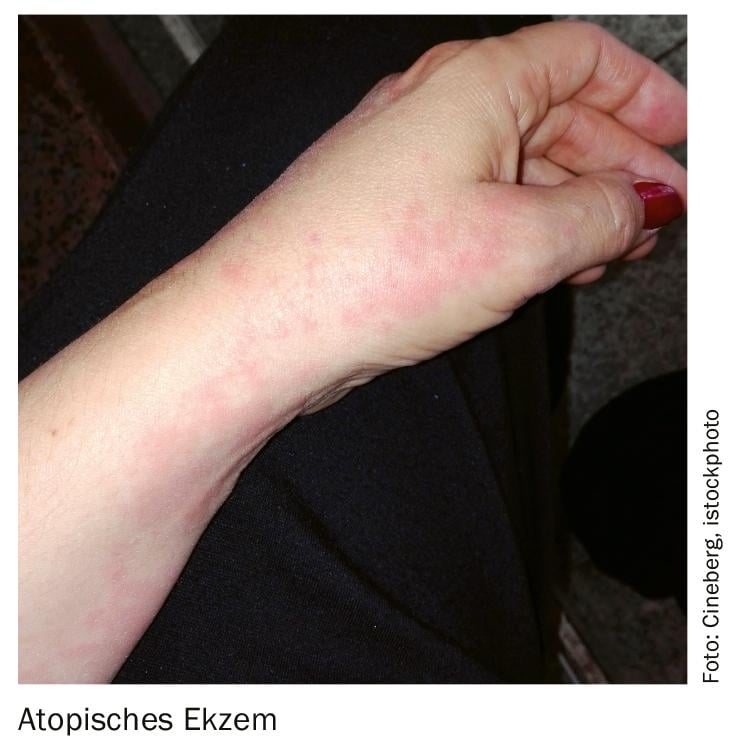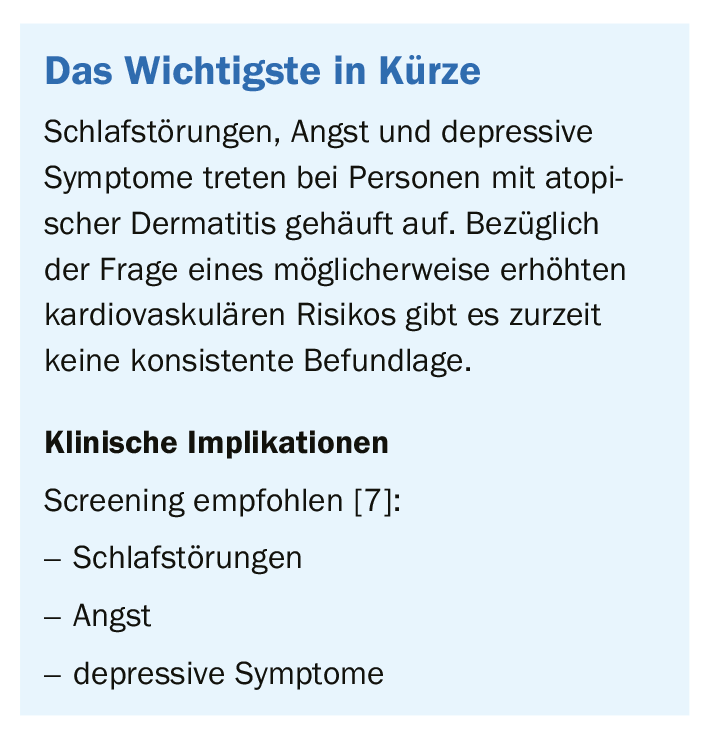Sleep disturbances, anxiety, and depressive symptoms are common in individuals with atopic dermatitis and should be considered in treatment. With regard to the question of a possible increased cardiovascular risk, the evidence is inconsistent.
Regarding sleep disorders, anxiety and depressive symptoms, screening by the treating medical professional (family doctor or specialist) is recommended. With regard to the question of whether atopic dermatitis is also associated with an increased risk of cardiovascular disease, there are currently no consistent findings. The usual preventive measures (including advice on exercise and smoking cessation) can also reduce cardiovascular risk in this patient group.
Sleep disorders are common
Epidemiologic standardized data show that fatigue (OR 2.97; 95% CI 2.65-3.34), daytime sleepiness (OR 2.66; 95% CI 2.34-3.01), and insomnia (OR 2.36; 95% CI 2.11-2.64) are clustered in individuals with atopic dermatitis. The 1-year prevalence of fatigue is higher in adults with eczema than in a healthy control group (32.8% vs. 27.5%) [1]. Sleep disorders can be associated with emotional and behavioral problems, headaches, attention deficit disorder, and other health impairments and should be assessed in the medical history, according to the speaker [1]. However, sleep specialists are only required for patients who have persistent sleep disorders that persist regardless of adequate treatment of the skin disease.
Anxiety and depressive symptoms vary
A 2018 meta-study [2] demonstrated statistically significant associations between atopic dermatitis and depressive symptoms, both in adults (pooled OR 2.19; 95% CI 1.87-2.57) and in children (pooled OR 1.27; 95% CI 1.12-1.45). Regarding anxiety, only adult data are available (pooled OR 2.19; 95% CI 1.75-2.73). In addition, statistical analysis revealed positive correlations between atopic dermatitis and suicidality (pooled OR 4.32; 95% CI 1.93-9.66).
As a clinical implication of these findings, the authors summarize that depressive symptoms, anxiety disorders, and suicidality should be considered in the treatment of patients with atopic dermatitis. Whereby symptom relief of the skin disease alone can also have a positive effect on the comorbid psychological state.
According to a case control study published in 2018 conducted in Canada among 15-55-year-olds over a 10-year period, patients with persistent eczema (five or more eczema-related medical visits over five years) have a moderately increased risk of suicide, although this is not independent of general health status and can be reduced by adequate suicide prevention [3].
Cardiovascular diseases: complicated structure
Data on a possible correlation between atopic dermatitis and cardiovascular disease are inconsistent. According to Ascott et al. adults with atopic dermatitis have an increased risk of various cardiovascular diseases, such as stroke and myocardial infarction, depending on the severity of atopic symptoms [4]. Epidemiologic data from Silverwood et al. also indicate that severe atopic eczema in particular is a potential cardiovascular risk factor [5]. Drucker and Harvey postulate an explanatory model according to which several mediator variables influence the association between atopic dermatitis and cardiovascular disease (e.g., sleep disturbance, depression, smoking, obesity, hypertension, physical inactivity) [6].
Source: AAD Annual Meeting 2019, Washington (USA)
Literature:
- Silverberg JI, et al: Sleep Disturbances in Adults with Eczema Are Associated with Impaired Overall Health: A US Population-Based Study. The Journal of investigative dermatology 2015; 135(1): 56-66).
- Rønnstad ATM, et al: Association of atopic dermatitis with depression, anxiety, and suicidal ideation in children and adults: A systematic review and meta-analysis. J Am Acad Dermatol 2018; 79(3): 448-456.e30. doi: 10.1016/j.jaad.2018.03.017.)
- Drucker AM, Thiruchelvam D, Redelmeier DA: Eczema and subsequent suicide: a matched case-control study. BMJ Open. 2018 Nov 25; 8(11):e023776. doi: 10.1136/bmjopen-2018-023776.).
- Ascott A, et al: Atopic eczema and major cardiovascular outcomes: A systematic review and meta-analysis of population-based studies. J Allergy Clin Immunol 2018. Dec 18. pii: S0091-6749(18)32728-3. doi: 10.1016/j.jaci.2018.11.030. [Epub ahead of print].
- Silverwood RJ, et al: Severe and predominantly active atopic eczema in adulthood and longterm risk of cardiovascular disease: population based cohort study. BMJ 2018 May 23; 361: k1786. doi: https://doi.org/10.1136/bmj.k1786
- Drucker AM, Harvey PJ: Atopic dermatitis and cardiovascular disease: What are the clinical implications? J Allergy Clin Immunol 2019 [in press]. [Epub ahead of print]. www.jacionline.org/article/S0091-6749(19)30068-5/pdf
- Printer A: Slide presentation. Atopic dermatitis comorbidities: what do derms need to know? AAD Annual Meeting 2019, San Francisco March 2, 2019.
DERMATOLOGIE PRAXIS 2019; 29(2): 34













